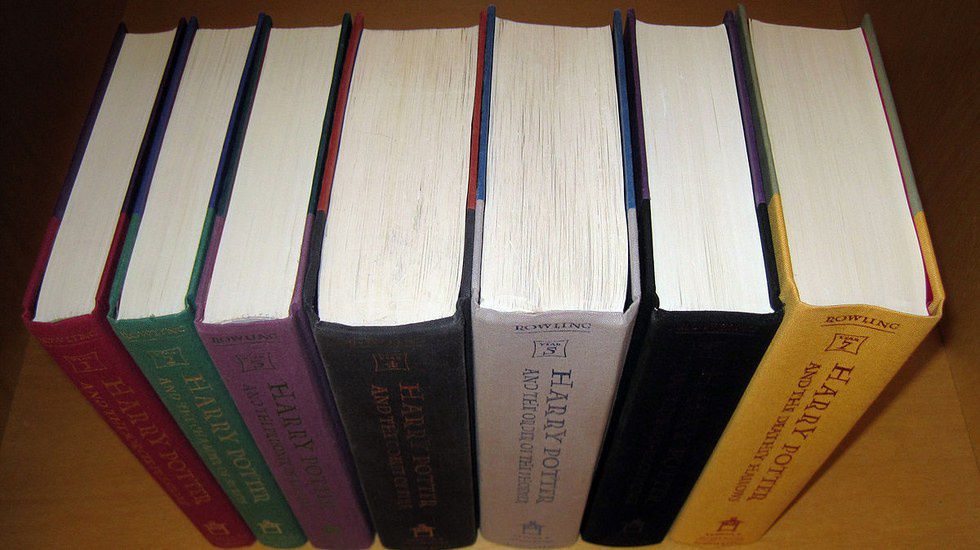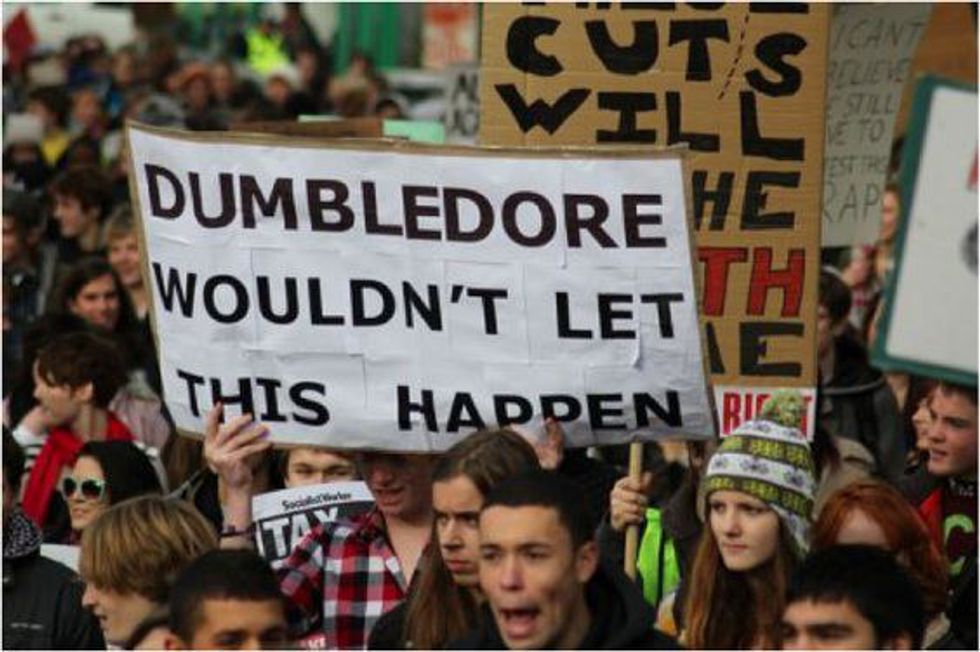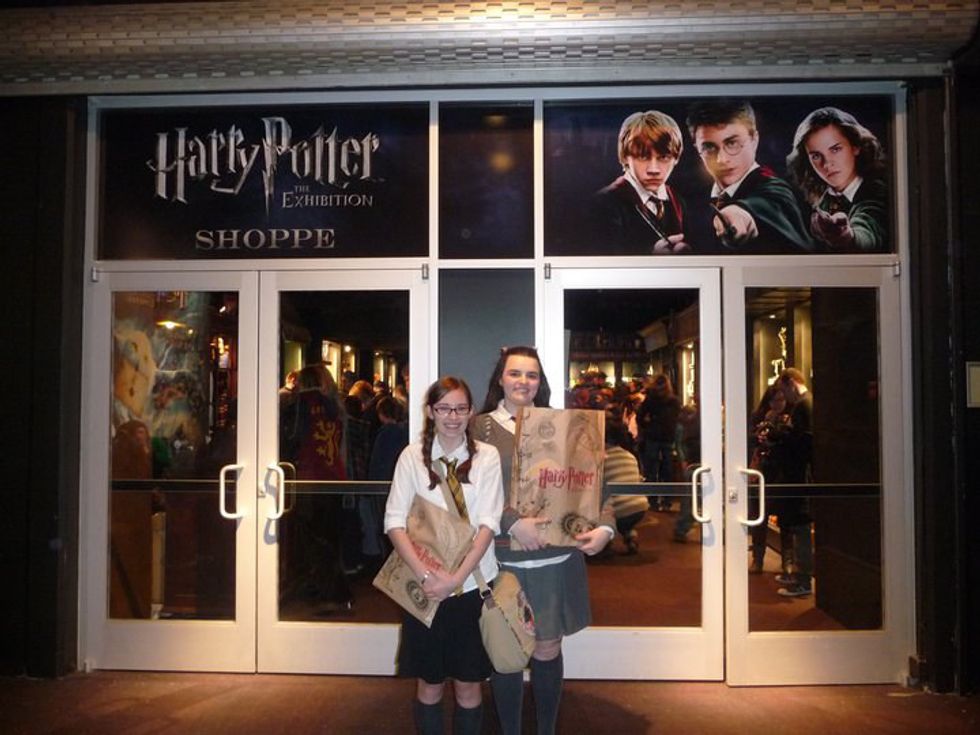“This boy will be famous, a legend. I wouldn't be surprised if today was known as Harry Potter Day in future. There will be books written about Harry. Every child in our world will know his name.” – "Harry Potter and the Sorcerer’s Stone" by J. K. Rowling
We are the Harry Potter generation. Minerva McGonagall’s in-text prediction of Harry Potter’s future fame is just as true in the Wizarding World crafted by J.K. Rowling as it is in our Muggle world. The millennials, who grew up amidst Spice Girls, presidential cigar sharing and Leonardo DiCaprio in his prime, also came of age alongside the most iconic 11-year-old in modern literature. For those born between 1985 and 2000, this meant the series’ widespread popularity and the way it influenced its fans not only ensured the cultural longevity of The Boy Who Lived, but shaped our entire generation.
Rising to fame in the age of the Internet, Harry’s sweeping popularity transcends age, gender, background, even language. The political undertones within the government and society of the world depicted within its pages are of great cultural relevance; it presented issues of race, class, corruption and more to me before I was included in discussions on any of those subjects. This, coupled with the key developmental age at which we engaged with Harry’s adventures, played a significant role in the political socialization of Millennials. Rowling’s portrayal of women within the series also reinforced many feminist concepts that were rising to the mainstream at the advent of publication, giving me Hermione Granger as a role model. The Potter books are a global phenomenon, one that overcomes language barriers and gives common ground for conversation to a staggering portion of Millennials. A sweeping and vibrant fan community solidified during years of midnight book releases and movie premieres (to which I can attest firsthand). By creating a resurgence of reading as a pastime and shaping a more liberal and accepting generation by reinforcing these ideas over the course of seven novels, the Wizarding World intrinsically changed the way we relate to each other, making Millennials the Potter Generation.
The Potter books’ domination of the Y2K literary scene is unquestionable. If the 450 million+ copies sold worldwide weren’t indication enough, the exploits of the boy wizard can be read in a whopping 47 different languages, a number rivaled only by The Bible. But the spell the series cast over the pop culture of the 1990s and ‘00s wasn’t just pure chance. A time of fast-paced change, the years during which I and my generation grew up were fraught with the upheaval of political and social conflict. “Joanne Rowling’s creation hits spot on by addressing many of the anxieties in our changing political and cultural world,” and Harry’s rise to global hero must be viewed within the context of his time—
1997, when the first book hit shelves, and onward. From Arthurian bravery to fairytale morals to even the classic British school story, Rowling wove together a number of elements found in beloved works past, creating a new children’s tale that would appeal universally. Rowling ushered in new millennium ideals by packaging them in a delightfully appealing “instant classic," making the young adult genre accessible to all.Besides legitimizing the YA genre, the series serves as a generational unifier. Beloved the world over in print and cinema, a common knowledge of the Wizarding World is assumed status quo for the Millennials, regardless of social group, gender, background, etc. The "which Hogwarts House are you?" question usually comes up at some point in the first conversation I have with someone; you can tell so much about a person based on where they would fall in the Sorting, and the great majority of my peers have an incredibly fierce loyalty to their House. I happen to be a Gryffindor. Tell that to any kid who grew up during the 1990s and 2000s, and they’ll already have an idea of what I might be like. Through Harry Potter’s place as “one of the greatest cultural events of our generation’s time,” not only does knowledge of the world/plot of the tale enter the collective consciousness of my generation, but so do its lessons. Exposure to sociopolitical dynamics as they are presented and understood in the Wizarding World is directly reflected in the moral, emotional and political beliefs of the Potter generation. Readers who deeply invest in a particular work often “see the real world through the filter of the media-created worlds into which the individual feels most transported," and the ubiquity of Harry Potter fandom, particularly widespread in the newly established far reaches of the Internet, deeply immerses Millennials in the events and themes of Harry Potter whether or not they are consciously aware of it.
The formative school years of wizards and Millennial readers alike took place during a politically tumultuous time, and the way Rowling handles this in her novels is a subtle model for the political socialization of readers. Growing up with characters my age who ran protests and underground resistance movements, who saw injustice in their world and decided to do something about it nurtured my already keen sense of right and wrong and my outspoken nature. To this point, the underlying themes of government corruption, the necessity for legal equality, and the political efficacy of a group of determined citizens demonstrated skills people of my generation would need to effectively engage in the emerging sociopolitical climate. The series “hit the Millennial Generation in their politically vulnerable years and engendered deep and widespread interest at an age when selective exposure and the ability to counter-argue are minimal," a phenomenon that, across the board, “strengthened the impact of the series and heightened the effect of the politically relevant lessons from the Wizarding World.”
The bureaucratic corruption, bumbling leadership and authoritarian undertones of the Ministry and Wizarding political leadership not only entered the mainstream during an important time in the political socialization of readers, but during a time when, at least in the United States, these themes were directly visible during George W. Bush’s reign in the White House. The negative portrayal of politicians, coupled with the call for collective action and the reinforcement of the idea that a group of people who fight for what they believe in can change the world correlates to, in a study conducted through the University of Vermont, not only a greater unfavorable view of the Bush administration among Harry Potter fans, but also a greater sense of individual political efficacy than non-fans. Additionally, the same survey found that among those who read Harry Potter, 58 percent voted for Obama, whereas among non-fans, the number was about 45 percent. Certainly, the sociopolitical tide of my world feels so much more liberal than past eras. Rowling’s novels primed readers for the idea that political institutions are often “run by self-interested bureaucrats bent on increasing and protecting their power, often at the detriment of the world at large," reinforcing this by frequently implying that “activists are more worthy of our trust than public officials.” As my generation became deeply engaged in the world of Harry Potter, these political views were cultivated and internalized, and models presented through the actions and values of the series’ heroes and villains are now reflected in “the consistent differences between fans and non-fans on perspectives that parallel the political lessons of the story […] which so captivated such a large segment of the generation during their formative years.” The across-the-board popularity of this strongly political tale hit Millennials during our most malleable years and shaped the views we carry with us into adulthood.
Similarly, social issues present in the Wizarding World primed fans for a more accepting and tolerant outlook on the world. Concepts of institutionalized racism, moral binaries, and open-mindedness toward difference are all repeatedly modeled throughout the Golden Trio’s story. Certainly the series helped raise the generation that grew up alongside it by "instilling in them some of the basic moral conceptions of right and wrong,” but on an even deeper level, important philosophical and moral pieces of wisdom are repackaged within the books and, subconsciously, these lessons are instilled in their readers. For instance, a quote from the wizard Kinsley Shacklebolt in "Deathly Hallows," “I’d say that it’s one short step from ‘wizards first’ to ‘purebloods first’ and then to ‘death eaters’. We’re all human, aren’t we? Every human life is worth the same, and worth saving,” directly mirrors Martin Neimoller’s poignant allegorical Holocaust poem “first they came for the Socialists…”, which stresses the importance of speaking up, and that as long as one group is unsafe and persecuted, all groups are. A central conflict of blood status (whether a wizard is of full, partial, or no descent from a Wizarding bloodline) is emblematic of race relations and institutionalized racism. Placing all Muggle readers in a society where they would experience the same discrimination helps to drive home this point—
not only in the overall societal workings but the daily lives of individuals, as readers will identify more readily with the blood status of someone like Hermione or Muggle Studies professor Charity Burbage than with the Purebloods who are immune to the prejudices and punishments of Voldemort’s regime.The Potter Phenomenon also fundamentally shifted the way people of the Y2K generation relate to each other and their world. Through Harry, readers are exposed to behavioral profiling (Harry’s ability to speak Parseltongue in "Chamber of Secrets" leads to the student body believing him to be the Heir of Slytherin), invalidation through propaganda (Harry’s portrayal in The Daily Prophet as ‘The Boy Who Lied’ after he claims Voldemort has returned turns the public against him, as he is politically dangerous), and the frequency of the students of Hogwarts or the Wizarding World at large turning against the hero, heightening the reader’s awareness of the role the press and stereotype play in our opinions of individuals. “The Ministry of Magic is very obvious, to the point of clumsiness, in its use of the Prophet for political means, clearly compromising its integrity as a reliable source,” and this leads many in Harry’s camp to turn to alternative forms of information spreading, from the independent newspaper The Quibbler to a network of information sharing among those resisting Voldemort. Growing up in the Internet age and the age of surveillance, the Patriot Act, and the NSA, a book series that imparts to children from a young age that the channels through which they gain their news and information can be deeply corrupt and censored was exactly what we needed. These undercurrents within Rowling’s series strongly groomed my generation to be skeptical of the mainstream media, reflected in the prevalence of social media as a source of news for the generation. The protests in Ferguson, for example, were initially hidden from the news cycle and reporters were removed from the city, and it was only through the independent social media postings of private citizens that I was able to hear anything about what was really going on. It was through our own kind of “Quibbler,” a media outlet not taken seriously by many but printing some of the only uncensored news, that the truth got out.
So it has come to pass that every child in the Millennial generation, every child in our world, knows Harry’s name. The cultural event that shaped all of us who comprise ‘The Potter Generation’ informed our social and political understanding of the world. The deeply generational collective experience of the Harry Potter story through fan events, book and movie releases, internet communities, and a common cultural experience akin to Beatlemania or the original theatrical release of Star Wars, became a lens through which a large number of those who grew up in the 1990s and ‘00s view the world. My fellow Millennials deeply understand Dumbledore's sage piece of wisdom from "Chamber of Secrets" (“it is not our abilities that show who we truly are; it is our choices"). Coming of age alongside the Golden Trio instilled within us tolerance, awareness, and a strong will to fight for what we believe is right. In this way, the lessons Hogwarts taught us have continued informing Millennials long after our acceptance letters didn’t come on our eleventh birthdays, and created a new wave of Dumbledore’s Army, shaped by a collective love of The Boy Who Lived.





















